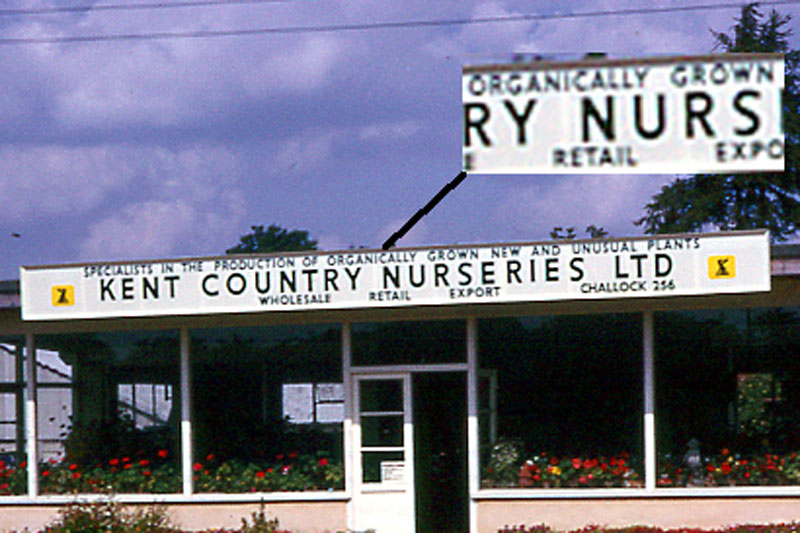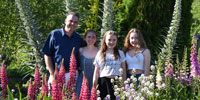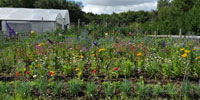 Are Victoriana Organic?
Are Victoriana Organic?
The simple answer to this question is 'yes', we always have been! The not so simple answer is what exactly does organic mean?
The picture on the right shows our old nursery premises and was taken in 1965. From the enlarged portion it can be seen that even back then we were extolling the fact that we grew organically.
In the late 1960's and early 1970's new pesticides and fungicides were being launched onto the market virtually monthly, and were seen as the way forward - the modern progressive way! But, despite being one for innovation - automated watering, automated ventilation, heated propagating beds and other such forward thinking technologies, chemical pesticides and fungicides were one 'advancement' that Jeremy and Joan Shirley didn't want to use. From his childhood onwards Jeremy had learnt the importance of growing things naturally - recognised by the fact he was appointed Seed Manager at Chase Protected Cultivation (now Chase Organics) at such a young age (and it was Jeremy who came up with the name 'Sea Magic' for their seaweed extract range currently sold as 'SM...')
And to this day we have continued with exactly the same ethos! We haven't only just jumped on the 'band wagon' for the sake of the current popularity of 'organic'!
- The land upon which Victoriana Nursery Gardens is built and upon which we grow our produce has been in the Shirley family's ownership since 1972 and during that time we have never used any chemical pesticide, fungicide or artificial fertilisers. Put simply we have never used any 'nasties' and never will. Prior to our ownership the land was owned by a local farmer and used for cereal crops - and similarly we are not aware anything of a noxious nature was used during his and his forefathers ownership.
- Our water supply to the nursery is drawn from a borehole 440 feet (135 metres) deep so even the water we nurture our plants with is as natural and pure as it can be (the Environment Agency test our borehole regularly).
- We are proud of the abundance of nature we have on the nursery - from the welcome frogs, toads, newts (including crested), slow worms, lizards, bats and a diverse range of birds (including an owl or two) to the less than welcome mice, rabbits and pigeons - and the very hopeful deer that live in the woods that surround us and peer over the fence hoping to find a way in!
This all adds up to the important fact that we can pick and eat anything edible on the nursery, whether it be vegetables on the vegetable garden or 'pinching' a strawberry from a plant being packed for dispatch to a customer - safe in the knowledge that it is entirely natural and safe to eat - and that of course means that when stuff arrives with our customers its similalry safe! So, whilst we do not hold any formal organic certification we ask you to draw your own conclusions.
So What Is Wrong With The Word 'Organic'
Try a search for DDT Organic Pesticide on a search engine such as Google (research last checked 07/01/2020) and you will discover that DDT is an organic pesticide - yes, one of the most dangerous and persistent pesticides known to man is organic! Our simple comment to this... is organic the correct word for produce grown or reared without the use of nasty chemicals or artificial fertilisers? We think not!
We do not in any way wish to upset the likes of The Soil Association, Garden Organic (formerly The Henry Doubleday Association (HDRA)) or any other similar organisation or publication - but this really does need thinking about!
- What we in the United Kingdom may consider to be the definition of 'organically produced' is not necessarily the same definition accepted by others around the world, perhaps even in some parts of Europe.
- Then one has to remember that the actual legislative requirements and definitions for growing organically differ greatly from Country to Country - something that should perhaps concern us all considering the amount of imported 'organic' produce.
- Worse still one has to think of what are known as 'midnight sprayers' - those who claim to grow organically yet avoid the prying eye of the inspectors by using things they shouldn't at times they know they will get away with it.
So yes, we are 'organic', but we prefer to describe our plants as 'naturally grown' - who can argue with what that means?


